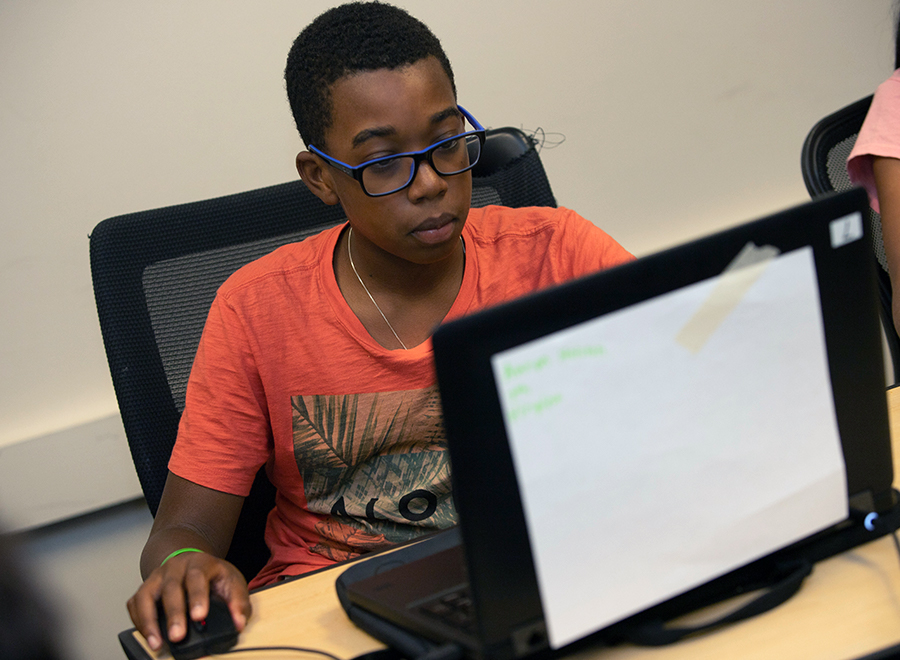
Fellows in the Field — Month One, Part One
Since August 1, our Constellations fellows have been in the classroom at the six Atlanta Public Schools (APS) that we have partnered with for the 2018-2019 school year. Fellow, PK Graff, who is partnered with Drew High School, Grady High School and Mays High School shares a few observations, insights and challenges from his first month of activating the Constellations pilot program.
School Situation
The first thing I noticed about the schools and educators that I would be working with was their enthusiasm for computer science and their willingness to learn. It is quite a daunting process to venture out of one's comfort content area to learn a whole new discipline, but these educators have been true champions for the CS brand. In one of the schools there were only two students in two sections of the AP Computer Science Principles (AP CSP) course, but through diligent cooperation between the teacher, myself, and administration, we were able to recruit 20-plus students to take the class and they really are enjoying the subject.
At another one of the schools, there is a full class of students with experience that varies from having already completed AP CSA to having no experience at all. The class attracted this wide range of students because it was “sold” as an introductory course with no experience necessary. While this is an effective recruiting tactic, it also is true for every Constellations led computer science course. We want every student to know that the door is open, regardless of their previous (or lack of) experience with coding. So far, there are several students who have no prior coding experience that are already standing out.
Overall the schools I have been paired with are poised for success. The equipment and personnel are equipped for APS to offer high-quality computer science education. The only thing lacking is the expertise. Constellations is now researching what it means to offer high-quality computer science professional development in a package that can be deployed anywhere, anytime
Comprehension > Memorization
After a couple of weeks in the classroom, many aspects of student life have become very apparent to me. For the most part, the students are focused on what it takes to get a good grade or high score on the AP exam rather than truly learning and understanding the material. This is a problem because the pursuit of a grade in place of knowledge often returns little to no growth. Whereas when a student is allowed to explore the context of a problem, understand how to frame the parameters of a solution, and then derive their own personal understanding of how to solve the problem at hand, only then is real learning achieved. The result of this personalized solution is an ability to apply the knowledge to new and subsequently more complex problems.
I have also seen some concerning disparities between the young men and young women in the Constellations classrooms. Over the past several weeks, I have seen the young ladies be far more willing to try first, fail fast and then iterate and try it again. On the other hand, the boys have often been slow to start, and easy to quit once a failed attempt has been reached. This is a generalization, as I have certainly had some talented young men who have quickly adopted an effective iterative process. It has been equal parts frustrating and fascinating to see that for the most part, the young men have displayed a lack of determination and curiosity, while the young women in my classes have been far more willing to speak out in turn and answer questions posed by myself or the classroom teacher. At the same time, this difference is exciting because the future is female, right?
September Goals
Ingrained in our urban culture is a willingness to work hard, fingers to the bone kind of work, but if failure is reached too often students cease all efforts.
There is still so much “Sit and Get” even though we know that students need to be working collaboratively. It seems that many are still just talking the talk and not walking the walk. The walk is messy and seemingly unproductive to administrative professionals, but sit and get is absolutely useless for so many students. The loss is minimal but the effort required is maximal.
In this next month, students will be touching real code for the first time and we could not be more excited.
For information on what my fellow colleague, Terry, is experiencing in his schools, please check back on the blog in a couple of weeks for his take on month one.



